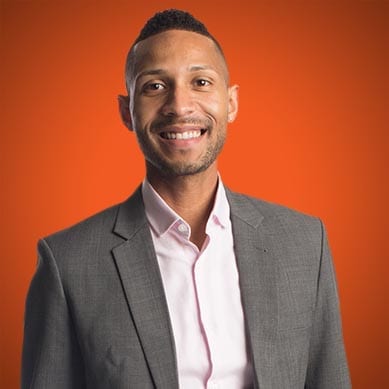Aaron Coleman is a PhD student in Social Policy and Management at Brandeis University. He is part of the Health Policy Research Scholars Cohort 2017.
Before we begin, tell us a little bit about yourself and what your research interests are.
My research interests all sit under the umbrella of social issues that stem from inequality—they include education inequality, the culture of poverty, social movements, syndemics, and HIV/AIDS among Black men who have sex with men.
On a personal level, I’m one of four boys from Forest City, North Carolina. When I’m not in my head about my research, I spend a lot of time scrolling through videos of cats—I find them hilarious. Also, just a little bit more personal—I never intended to go to college. It wasn’t a topic in my home growing up. Somehow, condescending questions of “What do you mean you haven’t heard back from any schools? Did you apply?” from friends in high school led me to send in a late application to one school, Western Carolina University. I got accepted, and well, now I’m a doctoral student.
What’s the story behind why you’re doing what you’re doing?
I grew up in rural Western North Carolina. My parents weren’t able to finish high school due to a number of circumstances—many of which are part of the African-American experience. After I entered graduate school, my parents were able to return to their education and successfully received their diplomas. They inspire me. In that regard, I’m a first-generation college student and a lot of what informs my perspective are the experiences of “growing up without” and navigating systems that were not designed to support or ensure my success.
Furthermore, my experience as a first-grade teacher at a school in Anacostia in Washington, D.C., teaching predominantly African-American students, provided an up-close and personal experience of the impact that poverty, student homelessness, and inequities in our education and legal systems have on opportunity—essentially robbing Black, young, smart, and beautiful minds of the power to compete with their white counterparts. Equally influential was the death of a friend from AIDS-related complications in 2016. In an era where new preventative strategies exist to reduce the transmission of HIV, or to assist those living with the virus to lead healthy lives, it seemed inconceivable that someone who looked like me would lose their life to this disease. All of these and a few other factors are what drive my research.
Tell us about a project you are currently working on that you are excited about.
At the moment, I’m preparing my research proposal where I plan to examine assets and sociopolitical structures and their impact on the health and economic well-being of underrepresented communities. I plan to conduct case studies that explore the responsibilities and potential benefits of community support groups and cultural network systems. I envision that organizational and cultural entities possess a certain untapped capital that, if understood and utilized passionately, might serve as a model to reduce inequities in our health and social systems.
For people unfamiliar with your research area, what is one piece of information you think is important for them to know?
If we listen, if we engage individuals and communities passionately, we can learn from them. We can and we must do a better job at understanding social ills. Doing this can really help us determine more accurately the methods required to respond.
Who is a researcher you admire and why?
I’m going to induct James Baldwin into the fold of researchers, because truthfully, his literary works broke ground and addressed a multitude of social and political concepts involving race, sexuality and gender. His writing and activism paved the way for constructive and transformative dialogue in the aforementioned areas. His quote, “To be a Negro in this country, and to be relatively conscious is to be in a rage almost all the time,” precisely embodies how I, and I’m sure countless others, feel in America.
How has being an HPRS Scholar helped you during your time as a doctoral candidate?
HPRS has been a phenomenal support to my development, both personally and academically. It can feel lonely in academic spaces, particularly at the doctoral level. Having the opportunity to network and collaborate with other students from underrepresented backgrounds has helped to positively transform my depiction of self. Given that I am a social policy candidate, the added influence of HPRS seeking to develop fellows’ understanding of policy implementation, values, and methods of framing has been invaluable.
In the RWJF HPRS program we have worked with you to help you think further about using your research to develop policy. If you could use your research to change any policy, what policy would it be?
I would mandate expansion of Medicaid and other important components of the Affordable Care Act. Data demonstrate that in states where the expansion did not occur, there are further complications and barriers to accessing health care. This issue hits hard for individuals in need of care for managing HIV or accessing medications that prevent its transmission.
Ok, here’s a fun question to wrap things up. If you could visit any place in the world, where would you choose to go and why?
Instead of choosing a place in the world that I haven’t been to, I’m going to pick one I’ve visited: Alaska, in the summer. It’s such a beautiful place. The wildlife, the glaciers, the outdoor activities … All of these things and more contribute to a calmness that I have yet to experience elsewhere.

